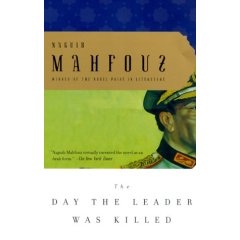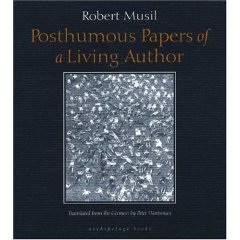

I took some time off to run some errands today and to do some reading. I finished Naguib Mahfouz’s story The Day the Leader Was Killed, which I found both eye-opening (for insights into how personal and familial relationships are shaped by societal norms and economic necessities) and a bit opaque, as it seemed to require more knowledge of twentieth century Egyptian political history than I possess. It did induce me to buy several of his other novels and stories, however.
I also stumbled on the recently released English-edition of Robert Musil‘s Nachlass zu Lebzeiten, which offers a fine sampling of the great author’s essays. Peter Wortsman’s translation, Posthumous Papers of a Living Author, is quite good.
Here’s a little sample, from “A Man Without Character,” in which Musil notes of literature that,
Novels contain descriptions of the most amazing modes of behavior for countless situations. The main drawback, however, is that the situations you actually get yourself into never accord altogether with those for which the novels have prescribed what to do and what to say. World literature is a huge depot in which millions of souls are dressed up with magnanimity, indignation, pride, love, disdain, jealousy, nobility, and meanness. If a worshipped woman steps on our feelings, we know that we are to reply with a reproachfully soulful look; if a scoundrel mistreats an orphan, we know that we are to knock him out with a single punch. But what are we to do if the worshipped woman slams her door shut in our face so that our soulful look never reaches her? Or if a table laden with costly crystal separates us from the scoundrel mistreating the orphan? Shall we break the door down to cast our sensitive look through splinters; and should we carefully remove the costly crystal before resorting to the indignant blow? In such truly crucial situations, literature always leaves you in the lurch; maybe things will only get better in a few hundred years, when more facets of life are described.
For fun I’ve been reading Nicholas Ostler’s fascinating and remarkable Empires of the Word: A Language History of the World. I’m only a bit more than 200 pages into a 600 page book, but every page has been a treat.









